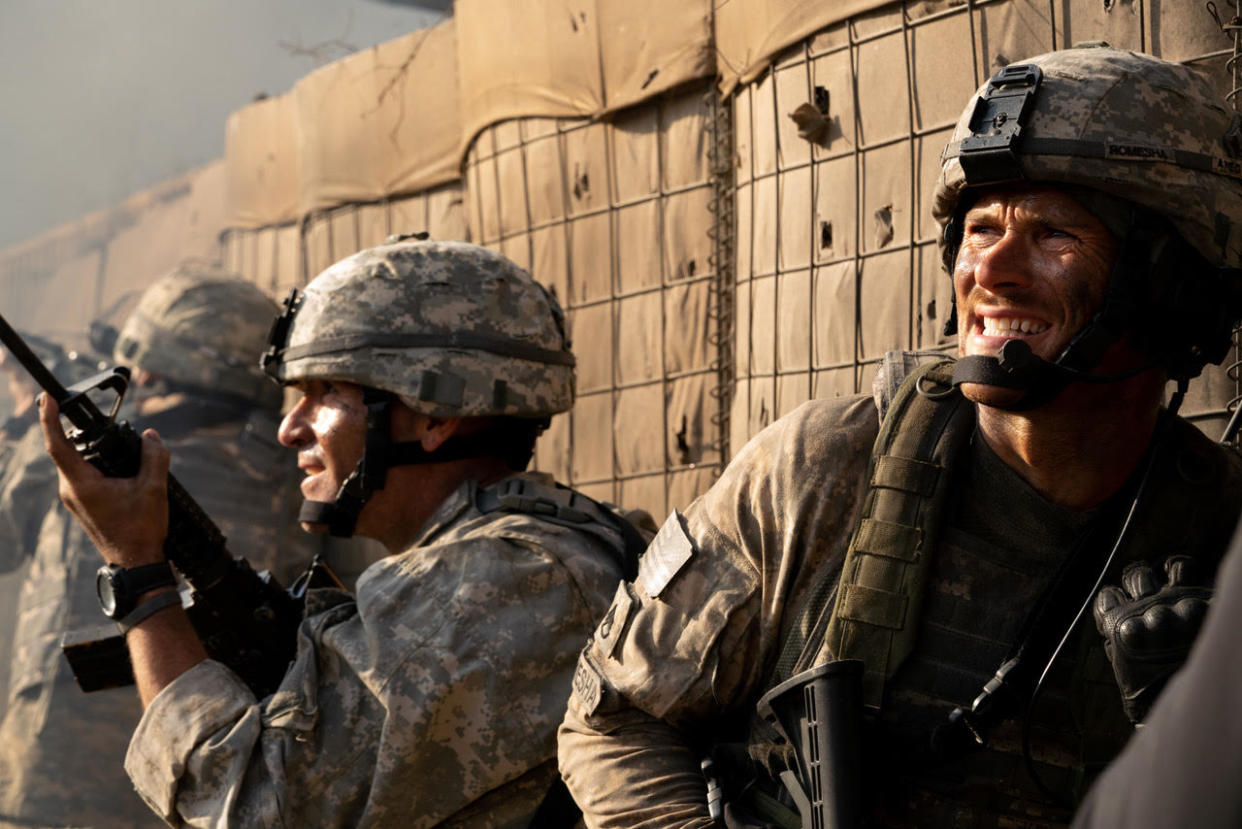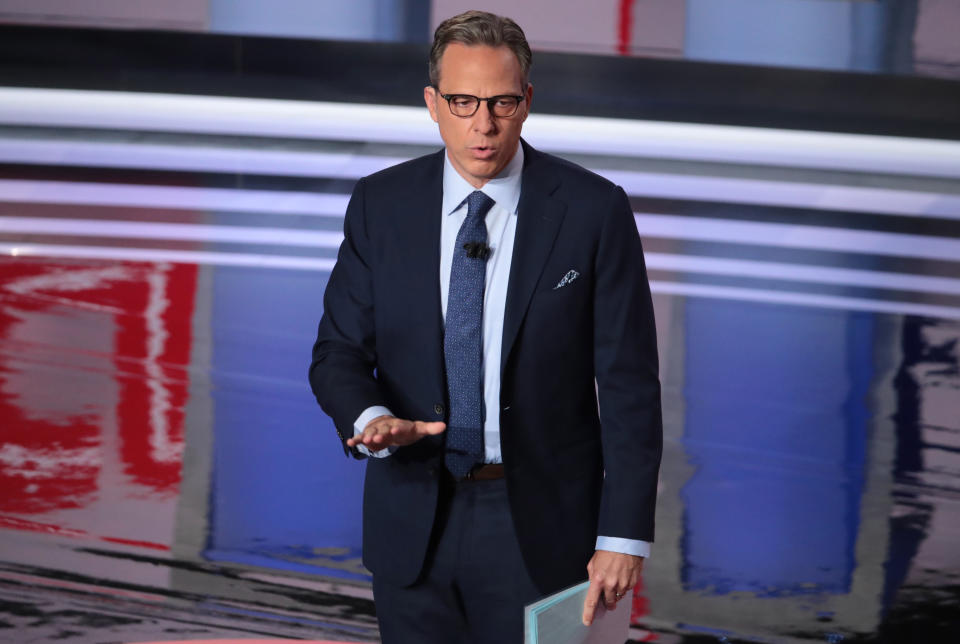Jake Tapper talks 'The Outpost' and why Trump and Biden have similar policies for the 'endgame' of the Afghan War

The recent bombshell news reports that the Russian government offered bounties to Taliban fighters to target American soldiers in Afghanistan has returned the Afghan War to the national spotlight. And President Donald Trump’s handling of the nearly two-decade long conflict is facing renewed scrutiny by Congress and journalists alike. For CNN anchor, Jake Tapper, the story is personal. In 2012, the network’s Chief Washington Correspondent and host of two shows — The Lead With Jake Tapper and State of the Union — published The Outpost: An Untold Story of American Valor, which recounts the Battle of Kamdesh, when Taliban forces swarmed a remote U.S. outpost staffed by a small group of soldiers, setting the stage for what’s commonly regarded as the deadliest conflict of the war. On July 3, the film version of The Outpost, written and directed by Rod Lurie and starring Orlando Bloom and Scott Eastwood, arrives in theaters and on VOD, a release that’s all the more timely because of current headlines.
During the course of researching and writing the book, Tapper befriended hundreds of U.S. military service members and their families, and remains in close contact with them today. “We've known for years that the Russians have been disrupting the U.S. mission there, arming insurgents and more, so it's not surprising — but it is, on a human level, very upsetting,” Tapper tells Yahoo Entertainment via e-mail about how they’re reacting to the emerging Russian bounty scandal. “One of the first responses I heard was from a military mom who seemed just as upset with the president's reaction, which seemed focused more on passing the buck and saying he hadn't heard anything about it, as opposed to protecting the service members we send over there. It's all pretty distressing.”

Speaking on the phone with Yahoo Entertainment last week before the story broke, Tapper offered up a more measured critique of the Trump administration’s current approach to Afghanistan, which included signing a controversial peace deal with the Taliban in February. In the ensuing months, though, evidence has emerged that the militant group hasn’t been sticking to the agreement. “It's complicated, because you don't make peace with your friends — you make peace with your enemies and the Taliban is the enemy,” Tapper says. “And yet at the same time, you don't want to be so desperate for a peace treaty that you pretend that the Taliban is something that it isn't. I think there are serious questions as to whether or not they are still allied with serious terrorist organizations like Al-Qaeda or ISIS.
“I understand the desire of the president to want to withdraw a significant number of troops from the region,” Tapper continues. “I also understand those who say that there should always be some sort of counter-terrorist presence of the United States in the region. Not necessarily 10,000 or 20,000 troops, but maybe some smaller forces or whatever. It's not my job to have a policy position — just to have the right questions to ask lawmakers about this.”
As the 2020 election cycle heats up, Vice President Joe Biden has taken a commanding lead over Trump in most polls, and the presumptive Democratic nominee has frequently pointed out how his policies differ from the current administration. But in regards to Afghanistan, at least, Tapper sees more similarities than differences between the two candidates. “I don't actually think there is a huge amount of policy difference between the two when it comes to what they want the endgame to be,” he says. “Both Trump and Biden would prefer a smaller footprint with some sort of counter terrorism presence just in case ISIS, or Al-Qaeda or whatever, rises up again. But I don't actually see a huge amount of difference. The difference is, obviously, in what is done. We've been there now for almost 20 years. My children are 10 and 12; they have never known a world where we didn't have thousands of service members in Afghanistan. It has been for them the way that having troops in Germany or Korea has been for me, and that's just astounding to me.”
We spoke with Tapper about watching his book come to life onscreen, and the experience of reporting for a network that Trump and his supporters frequently target as “fake news.”
Yahoo Entertainment: You’re in the interesting position of watching a movie that’s not only based on your book, but also based on recent history. What was it like watching the film come together?
Jake Tapper: It’s been a long journey: The attack on Combat Outpost Keating happened on October 3, 2009, and the book came out in 2012. So I've been involved with the movie for a long, long time, and it's gone through several different iterations with different directors. The first time I saw it was at a very small screening of a rough cut early last year. My wife and I were very moved by how good a job Rod did. It wasn't a surprise, because he’s a military veteran himself; he went to West Point and had a real feel for the material. We had gone to visit the set in Bulgaria in 2018, and they had recreated this entire outpost in Afghanistan.
There were veterans of Combat Outpost Keating who had served at the actual camp and were working on the film, and they couldn't believe how authentic it was. And then last October, we held a private screening in Washington D.C. for some of the veterans and the Gold Star families. That was nerve-wracking, because I can't imagine what they've gone through in terms of losing a loved one in battle, and then seeing somebody portraying your loved one or portraying you in a film like that. We had counselors there, just in case anybody needed to talk to a counselor.
But afterwards, it was very moving: They all felt the film was in honor of their loved ones or of their own service, and that was incredibly meaningful to me. There are a few conflations here and there [in the film], because the book covers the three-and-a-half year existence of the outpost, and there were four different deployments of troops in that time. So there were a couple of liberties taken by having people who served there in 2006 and 2008 appear in the film as if they were there in 2009. But we did that to honor those troops that had been there before, not for any other reason. We wanted to have respect and reverence for the fact this story is about real people who died there, while also making a compelling film that people understand in an emotional and visceral way.
You covered the Afghanistan War from these shores, but traveled there to research the book. What was it like to actually be on the ground?
By the time I had heard about Combat Outpost Keating, the U.S. had already destroyed it, or were about to destroy it. I went to Afghanistan twice while researching the book, and the second time I got as close as I could to where it used to be. I was embedded with these guys at Forward Operating Base Bostick, the 227 Wolfhounds and then with a medevac unit. The whole point of visiting Afghanistan was to see up close what I had been covering from a distance. I don't know how to describe it other than to say that it feels as if it's on another planet, because it's so disconnected from what people in the United States are paying attention to and yet we had tens of thousands of U.S. soldiers over there at the time. Now, I think it's about 10,000 soldiers over there with a lot of contractors who aren't included in the official counts. When we got to FOB Bostick, the mission was providing security for building a road so that there could be commerce, and improve the way of life for Afghans in that province. It's just otherworldly, because you’d think building a road would be a basic project, and yet U.S. troops were being killed just for being there.
Did your time in Afghanistan change your perspective on the war?
My visit was in 2011, so that's almost a decade ago now. Since then, I don't know how many thousands of lives have been lost. It makes you see in a tangible way that this is very difficult work, and it obviously makes you question even further what we're doing there and whether it's worth risking all of those American lives. It’s been said that we haven't fought in a 19-year war in Afghanistan: We’ve just fought a one-year war, 19 times in a row, because there's so little institutional knowledge or appreciation of what works and what doesn't work. It makes you appreciate the sacrifice even more, but also question the decisions made by people sitting at desks in Washington D.C.

Did you notice a disconnect in the opinions of the service members versus those in the military hierarchy about what they were doing there?
The service members are all over the map politically. It's probably fair to say that they lean conservative, but there are also very liberal and very Libertarian members of the military. They are the most patriotic people you'll ever meet. But I don't know one of them who thinks that it would be good for us to be there for another decade. I think that there’s an acceptance among many veterans, and current troops, that the leaders in Washington have failed the troops when it comes to sending them to Afghanistan and keeping them there. You always need to have an exit strategy, and that's one thing that we've never really had in Afghanistan.
Do you have any personal feelings about what should happen next?
Obviously I hope that there's peace and that the U.S. can withdraw as much as possible. But I'm not a senator, so I don't have a position or a five point plan on what we need to do to win the war in Afghanistan. The only position I have is that I think we should all be thinking about these people and talking about them more and doing everything we can. I'm active in a group called Homes for our Troops, which raises money to build mortgage-free specially designed homes for the most severely wounded veterans of Afghanistan and Iraq.
On one level, I'm so honored to be an ambassador for this group. But on another level, it's insane that it's a private charity. People lose limbs fighting a war for us, and the U.S. government and the American people don't automatically make sure that they have a house they can live in where they can get around and use the shower? So there's a lot of work that needs to be done. I hope that people are moved by the movie, and try to understand and pay more attention to what our service members do. We're still losing service members abroad, and we're still losing veterans in this country to illnesses or injuries that they picked up over there. Things are still going on that citizens can do more about it if they want.
For the service members who have come home, is it frustrating for them to see people unaware of what’s happening in Afghanistan?
There's a passage in the book where a friend of mine, a lieutenant named Dave Roller, is expressing sadness over the fact that most Americans have no idea what's going on in Afghanistan. Instead, they're more concerned about — and this tells you how long ago this was — who Paris Hilton is dating than the commander he just lost. I'm too old to even know who Paris Hilton would be replaced with today, but the idea that there are still people literally giving everything for this mission, that most politicians, forget the public, don't think about on a day-in and day-out basis is a disgrace.
Do any of the veterans you know have any opinions about the calls to bring the military in during the Black Lives Matter protests?
I'm friends with hundreds of troops and their politics range from far left to far right, so you get expressions of frustration in all facets. I would hate to generalize about it. I didn't hear from anybody talking about the military being sent into the cities or anything like that. People have their opinions about Trump and about the protests and about tearing down statues and all the rest, but it's a wide array of takes.
Are there any concerns in regards to the connections between the military and policing in terms of equipment or former soldiers going into the police force?
A number of people who served at COP Keating are now police officers, but I don't think that they think it's like doing the same thing that they were doing before. I think they think it's a completely different job. It's certainly an important debate, and I know that there's a concern, but it's not something I've talked about with them.
You’re on CNN, which is a frequent target of Trump supporters and Trump himself. How do you approach your job in that environment?
I approach it the same way, which is just to keep my focus on delivering the news and not get distracted or intimidated. The president obviously attacks anybody who tries to provide any sort of oversight of his behavior and his administration's actions, whether it's inspector generals, judges, individual jurors, the free press or Congress. Anybody trying to hold him accountable or hold the White House accountable, he objects to and engages in rhetorical assaults like “fake news,” or accusing people of various crimes that are insane for him to be leveling.

But our focus is just to keep talking about what's really important. Right now, what's really important is the fact that 120,000 Americans have died of the novel coronavirus with projections that 80,000 more are going to die before Thanksgiving, and the economic difficulty that so many Americans are having because of this. These are the stories that we're going to keep covering, and we'll continue to cover President Trump and the things that he does that are good for the country and the things that he does that are not so good for the country. But it’s not as though his attempts to distract are succeeding when it comes to me and my show.
Are there general prescriptions you’d offer to the media as we enter a summer where the election cycle is heating up and the coronavirus pandemic is still out there?
I just think the free press needs to keep doing its job and focus on being fair, neutral and impartial observers of what's going on. If someone tells a lie, it needs to be called a lie; if somebody says something that's racist, it needs to be called racist. But by the same token, a lot of people out there on the far left and the far right are trying to get people in media to take the bait, and respond with emotion that they attack us with. And you can't let them succeed. We're not here to engage in personal attacks on people, we’re here to report the news. And because of social media and because of just sheer indecency, a lot of political mischief makers spend a lot of time trying to get us to overreact. It's just important for everybody to not take the bait.
The Outpost opens Friday, July 3 in theaters and via on demand services including iTunes and FandangNOW.
For the latest coronavirus news and updates, follow along at https://news.yahoo.com/coronavirus. According to experts, people over 60 and those who are immunocompromised continue to be the most at risk. If you have questions, please reference the CDC’s and WHO’s resource guides.
How to maintain your physical and mental health during the pandemic
Taking care of a loved one with COVID-19? Here’s how to stay healthy
Q&A with Dr. Kavita Patel: How to keep your family safe and maintain your mental health
Read more from Yahoo Entertainment:



